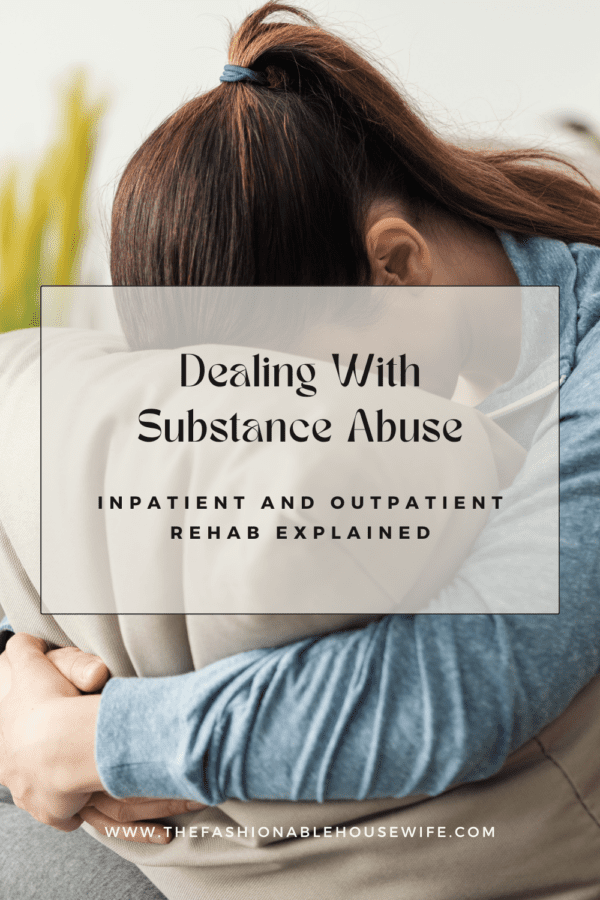
47,000+ deaths recorded in Canada each year are substance abuse-related. But drug or alcohol addiction isn’t a death sentence: it is reversible. But recovery from drug or alcohol use is a step-by-step process, and you cannot do it alone.
Sailing through the rough waters of addiction with the high waves and strong wind can be overwhelming. It can make you feel uncertain about which way to take. This is where rehab centers come into play; they offer inpatient and Outpatient treatments to help you through recovery.
But what is inpatient and outpatient rehab? How do you know which one is best for you? If you have these questions on your mind or you have someone who is on this road, then this post is for you.
This is your guide to finding what is comfortable and smooth for your recovery. So follow closely to learn everything about inpatient and outpatient rehab to know what’s best for you.
Image Credit: Pexels

Substance Abuse 101
It is okay for some people to take a glass of wine, and it ends there. Others, however, tend to indulge in one too many glasses; they just can’t find the balance between drinking responsibly and being overindulgent.
People in this group suffer from what the CDC describes as substance use disorder. It affects the brain and makes them unable to control behavior. In other words, substance abuse involves using drugs or alcohol beyond its required dose or prescription.
Although the damages are pretty obvious, people still use a lot of substances. Everyone has a distinct motivation for getting addicted to drugs and alcohol. While some people may ride on the wings of anxiety and depression, others may blame peer pressure and family members.
One of the major complications of substance use disorder is the ability to accept that, yes, you have a problem that needs attention. But unfortunately, most people ignore the signs and feel like there is nothing, or they just enjoy the highs.
In this case, it’s better to watch out for the possible signs of substance abuse in a person. These signs include:
- The need to always use drugs and alcohol to block out thoughts
- Total dependency on these substances
- Uneasy feeling whenever you don’t have access to drugs and alcohol
- Inability to quit or control some habits
When these signs, amongst others, begin to show up, booking an appointment with an expert. It’s crucial to explore drug and alcohol recovery programs that cater to individual needs and provide a comprehensive approach to healing.
What Is Inpatient Rehab?
Inpatient rehabilitation is best for people who are probably deep into an addiction. They constantly watch and care to help them heal or quit using.
There may be little interaction with the outside world when receiving treatment in an inpatient facility. For example, although specific times are allowed, people frequently do not have access to their cell phones when in inpatient rehabilitation.
In addition, stringent protocols are in place to guarantee that patients can concentrate on recovery. This is to ensure there are no interruptions or external triggering events.
Inpatient rehabilitation begins with a well-supervised detox, as with every other addiction rehabilitation program. However, substance withdrawal may be dangerous, so inpatient detox provides close professional supervision during this period.
When some constantly depend on a particular substance, the body relies on it to perform normal functions. So when that substance is gone, the body goes through withdrawal. These symptoms can happen when someone abruptly stops using an addictive drug or drastically cuts back on their use.
So inpatient rehabilitation offers constant care, 24/7 attention, and a safe space to recover without any disturbance. Start looking for alcohol rehab in Michigan, as it is never too late.
Outpatient Rehab: The Power of Recovery
Having read about inpatient rehab above, you must have already guessed this concept. But without any assumption, let’s get straight to it. What exactly is outpatient rehab?
Unlike Inpatient rehab, this type of treatment does not require you to stay in the facility 24/7. In fact, you can receive outpatient treatment from the comfort of your home. In addition, this treatment style is flexible and allows you to continue your life recovering.
So you don’t have to put your entire life on hold to recover from substance use. Different types of outpatient rehabilitation suit different personalities. They include:
- Partial Hospitalization Program: This involves several hours of treatment daily or several days a week. But patients are free to return to their sober community or homes after each day.
- Intensive Outpatient Program: These are tailored based on the client’s needs and level of addiction. It involves personal considerations and treatment. As for the period, it may go as far as several weeks.
- Support Groups: These are also called care groups. They offer support to persons who recover to solidify their commitment to sobriety. They provide members with the necessary skills to scale through their sober life.
Outpatient rehabilitation has many concepts too. It can range from counseling periods to medically aided treatment (MAT).
One of the significant benefits of outpatient rehab is that you don’t have to put your life on an abrupt stop. In addition, outpatient rehab is relatively pocket-friendly compared to its inpatient counterpart.
Outpatient vs. Inpatient Rehab: Making the Right Choice
This may be tricky because there is no one-size-fits-all regarding which one is best for you. This is because there are a plethora of factors that may influence your choice of treatment.
First, the severity of your action should be your first consideration. Are you in a state where you can still handle other life affairs? Or is it becoming like a mental illness? These questions should help you choose which type of treatment you will need.
Also, the responsibilities you have at hand can be a major factor. You may consider outpatient rehab if you have a family to care for or a job needing your attention. In addition, if you have a strong family and friends ready to support you, outpatient rehabilitation can also be your holy grail.
However, if you lack support and need a confined place to recover, you should opt for inpatient rehabilitation.
Final Words
Alcohol and drug addiction can throw you into danger and possible mental disorders. Therefore, finding help as soon as possible is critical to recovery.
Thankfully, this post has provided all you need regarding outpatient and inpatient rehab. Each treatment program is designed to fit a particular lifestyle and person. So whichever choice you make will surely get you to your promised land of freedom.
However, it is crucial that you put every factor highlighted above into consideration when choosing a program. It will help you to make an informed decision and get






